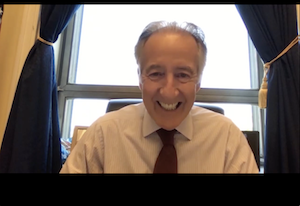Rep. Richie Neal (D-MA), Chairman of the House Ways & Means Committee, kicked off the 2020 NAPA D.C. Fly-In Forum July 21 by sharing his retirement policy legislative priorities over the coming weeks and months.
Neal has long been a champion of retirement policy and has served as Chairman since the beginning of 2019, when he authored and helped secure enactment of the SECURE Act. 
Addressing the need for an additional economic stimulus package in light of the COVID-19 pandemic, Neal submitted that the HEROES Act is going to have to happen. “There’s broad agreement behind the scenes and complacency is not an option now,” he told the Fly-In Forum delegates, adding that the current situation is “a reminder of just how grim this can become if we embrace this false sense of confidence.”
Asked by American Retirement Association CEO and NAPA Executive Director Brian Graff about the possibility of including funding relief for 401(k) plans as part of the next round of stimulus—who also noted that many employers are struggling to keep their plans going—Neal expressed an openness to the possibility. “I do think there’s an opportunity. I think that I’ve succeeded in heightening the whole retirement issue with the Speaker of the House,” Neal stated, adding that the HEROES Act includes substantial relief on the DB side and that he is “open to the idea of providing relief on the DC side.”
The $3 trillion HEROES Act passed the House in May. In addition to funding for state and local governments, Coronavirus testing and an expansion of the employee retention credit, the bill also includes additional relief from required minimum distributions, clarifications to the retirement provisions enacted under the CARES Act, funding relief for single-employer pension plans and an assortment of other changes.
Neal raised the issue of plan leakage, noting that in the CARES and HEROES Acts, Congress made a lot of accommodations, but that it’s important to address the issue. “We need to make sure that [participants] put the money back and don’t use retirement money for anything other than emergencies; that should still be the north star for us,” the Chairman noted.
Financial Transaction Tax?
Looking further down the road next year, Graff asked Neal about whether the various proposals at the state and federal level for a financial transaction tax (FTT) will put pressure on him to consider one as part of an effort to address deficit issues. Neal didn’t express support or opposition to one, but suggested that a lot of issues can be addressed in a low interest rate environment without the need for an FTT. “We can go a long way in getting things done [with borrowing],” he noted. “The other issue here that’s really critical is that you’re not going to get people back to the workplace until they feel it’s safe to go back to the workplace so I think continuing to borrow for hospital money for testing, for example, is good public policy.”
Neal also expressed optimism that whether President Trump is reelected or former Vice President Joe Biden is elected, Congress is likely to continue to build upon enhanced retirement savings efforts, noting that the House Ways & Means Committee has a history of doing things on a bipartisan basis. “My mark has been trying to keep agreement front and center. I believe we can reach agreement on a number of things with retirement savings at the top,” he said.
SECURE Act 2.0
Neal noted that a SECURE Act 2.0 is already waiting in the wings, and that given the precedent established with the SECURE Act, an agreement could be reached as soon as this year, perhaps in a lame duck session. “The bill is ready, and I don’t see why we can’t pass it in the next few weeks,” Neal observed.
Addressing the coverage gap is another top priority of Neal’s. Citing increased life expectancy and an average Social Security benefit of about $16,000 per year, he noted that it “becomes pretty important for those of us who are interesting in retirement savings to make it accessible and uncomplicated.”
While he didn’t go into the details of his ARPA legislation—which would require employers to maintain a 401(k) or 403(b) plan that covers all eligible employees, with certain exceptions—Neal noted that it does include a mandate, which can be a hard sell for both caucuses. “Part of the lead-in here is the argument offered about the auto IRAs; that’s part of the bridge,” he noted, explaining that he thought they were going to get there when former Rep. Dave Camp (R-MI) was Chairman of the Ways & Means Committee, but Republicans became hesitant when they heard the word “mandate.”
“We need to tell everybody that the genius of retirement is giving people in earlier in life, a more predictable, efficient and easy way of access,” Neal emphasized.
This year the annual two-day Fly-In Forum is being held in a virtual format for the first time in its eight-year history.

